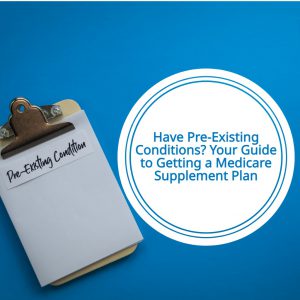Having a pre-existing condition used to be a serious problem for people looking for health insurance. Fortunately, the passage of the Affordable Care Act in 2010 changed that for people purchasing private insurance. But what about Medicare beneficiaries? Medicare Parts A and B cover anyone who paid into these programs, but what about Medicare Supplement Plans? Can you be denied for these plans – or charged more for one – if you have a pre-existing condition? With pre-existing conditions affecting an estimated 53.8 million adults 65 and older, this is an important question.
What Is Considered a Pre-Existing Condition?
Almost any illness or injury you had prior to enrolling in your insurance plan can be considered a pre-existing condition. The list is long but some of the most common ones are cancer, diabetes, end stage renal disease, and stroke. Not all pre-existing conditions are as serious, though: things like asthma, sleep apnea, and lupus can be pre-existing, too.
When it comes to Medicare specifically, for a condition to be considered a pre-existing, you have to be diagnosed and begin treatment before your Medicare start date. Even if you don’t receive a diagnosis before enrollment, your condition can still be count as pre-existing. For example, if you have a condition with emergent symptoms that the average person would have already had treated, your insurer can classify it as pre-existing.
What Are Medicare Supplement Plans?
Medicare Supplement Plans are insurance plans offered by private companies. They help cover the out-of-pocket costs of Original Medicare. While Medicare covers most of your health services it won’t cover everything: for example, Medicare Part B only covers 80% of medical services, leaving you to pay a 20% coinsurance. But if you have a Medicare Supplement Plan, this coverage will kick in and pick up the remaining costs.
Medicare Supplement Plans cover a number of things like copays, coinsurance, and deductibles, meaning you’ll only have to pay a low monthly premium. Some Medicare Supplement Plans even cover care you receive outside of the country, which Original Medicare won’t cover at all.
Can I Get a Medicare Supplement Plan with a Pre-Existing Condition?
Fortunately, the answer to this is yes! You can get a Medicare Supplement Plan even with pre-existing health issues. Companies that offer these plans are usually able to use underwriting to determine your eligibility. Luckily there is a way around it. It all depends on when you sign up for your plan.
The best time to get a Medicare Supplement Plan without worrying about being denied or paying more for your plan because of health issues is during your Medicare Open Enrollment Period. This period begins the first day of the month your Medicare Part B. And is in effect and lasts for 6 months.
Your Open Enrollment Period is the best time to get Medicare Supplement Insurance with pre-existing conditions. During this time, you have something called a guaranteed issue. This means that insurers have to offer you the best rates available. And they can’t deny you based on your health.
If you miss your Open Enrollment Period, you can still get a Medicare Supplement Plan. But you may run into problems like high premiums or a 6-month waiting period. This means that you will have to pay for expenses related to your pre-existing condition for 6 months. Once that waiting period is over, your Medicare Supplement Plan will start covering your costs as normal.
Some states do offer additional enrollment periods though, so check with your state’s Medicare office. Additionally, if you qualify for a Special Enrollment Period, you can skip the pre-existing condition waiting period.
How Do I Qualify for a Special Enrollment Period?
If you’ve missed your Open Enrollment Period, you can still get a plan with the better rates. There are a number of circumstances that can trigger a Special Enrollment Period. During which you can get a new Medicare Supplement Plan:
- Your employer’s supplemental insurance ends, or benefits are reduced
- Your Medicare Advantage Plan changes or ends its terms
- You move out of your plan’s coverage area
- Your Medicare Supplement Plan insurer commits fraud
- You are utilizing your “trial right” within 12 months of applying for a Medicare Advantage Plan for the first time
Need Help?
Enrolling in a Medicare Supplement Insurance plan with pre-existing conditions can be tricky. If you need help navigating the enrollment process, EZ.Insure is here to help! Our highly trained insurance agents are always available to help you with any questions. We also provide free instant quotes. Simply put your zip code in the bar above, or you can speak to an agent directly, just call 888-753-7207.
Co-written by Brianna Hartnett










